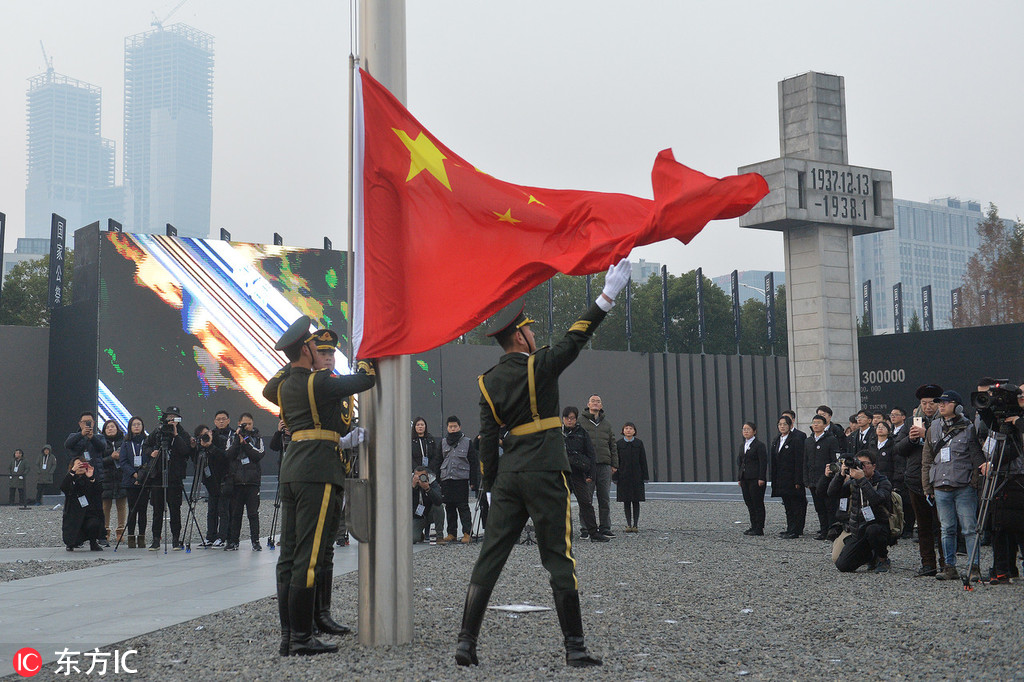
BEIJING, Dec. 17 -- December 13, 2018 marked China's fifth National Memorial Day for Nanjing Massacre Victims. That day, China organized a national memorial ceremony and relevant activities calling for keeping history in mind and cherishing peace, which drew wide attention from the international community.
Stephen Perry, chairman of the UK’s 48 Group Club, called the Nanjing Massacre “one of the most horrible incidents in human history.” He said that setting up the national memorial day for victims of the massacre was a right choice, which can enable people not only to keep in mind the brilliant achievements realized by China today, but also to remember the sufferings endured by Chinese people in the past.
Michael Charleston Chua, a history professor at the Philippine De La Salle University, said that it was very important and meaningful for China to set up the National Memorial Day of Nanjing Massacre Victims. The Philippines also suffered during World War II, and also set up a memorial day marking the end of World War II in the country in November.
Chua noted that people needed to remember what happened in the past, so as to avoid historical tragedies from repeating themselves in the future. He added that remembering the past is not to prolong hatred, but to learn lessons from history and to better understand what happens in the present and warn ourselves not to repeat mistakes in the future.
Luu Bich Ho, former director of the Institute of Development Strategy under the Vietnamese Ministry of Planning and Investment, noted that China held the national memorial day for victims in the Nanjing Massacre not only for remembering history but also demonstrating its pursuit and longing for lasting peace. While keeping the past in mind, China is also looking into the future and making efforts to achieve peace, cooperation and development.
According to a research fellow at the Institute of Far Eastern Studies under the Russian Academy of Sciences, the Nanjing Massacre was one of the most terrible crimes committed by Japanese imperialists in China, which is an irrefutable historical fact. He added that one of the greatest lessons we can learn from World War II is that we must do all we could to avoid new wars and prevent the world catastrophe from repeating itself, and it requires efforts of all people to maintain world peace.
The vice chairman of the Mandalay Branch of the Myanmar-China Friendship Association, said that learning history aims to prevent future generations from repeating the past mistakes. He noted that as the national memorial day was held in China, overseas Chinese in Myanmar also mourned for their compatriots who fell victim in the Nanjing Massacre 81 years ago. He also called for remembering the past and preventing historical tragedies from repeating themselves in the future.
Li Renliang, an expert on international studies at Thailand’s National Institute of Development Administration, commented that China set up the National Memorial Day for Nanjing Massacre Victims and held a grand national memorial ceremony in Nanjing, evidencing that the Chinese people keep history in mind and cherish peace. This also warned relevant countries not to neglect history, but to draw lessons from the past and jointly create a peaceful international environment, he added.
Carice Witte, executive director of the Sino-Israel Global Network & Academic Leadership (SIGNAL), said that both Israeli and Jewish people also suffered a lot in the past, and the past tragedies should be remembered to prevent them from happening again. She added that setting up the national memorial day is vital for China and its people to remember and understand the major tragedy endured by Nanjing in the past.
French painter Christian Poirot who once created oil paintings on the Nanjing Massacre and “comfort women” was invited to participate in a memorial event in Nanjing on December 13. He noted that the spark of seeking justice and respect for victims in the massacre has never died out, and the experience of watching the dance drama Deep Memory based on recollections of the Nanjing Massacre survivors made him “think over that episode of history” all over the night.
Ahmed Sallam, former media adviser at the Egyptian Embassy in China, said that China held memorial activities for victims in the Nanjing Massacre, with an aim to inform people in the country and the rest of the world that wars can only bring damage and hurt, and it’s hoped that people of all countries can learn from history and cherish and maintain peace.
Ronnie Lins de Almeida, director of the Brazilian Center for China Studies, hoped that the Japanese government could admit the atrocities it committed in the past as the German government, and maintain a correct attitude toward history. He added that the Nanjing Massacre would never be forgotten, and this episode of history reminds today’s people of cherishing the hard-won peace.
A political analyst and honorary professor at the University of South Africa, remarked that it is crucial to remember history, or we will be unable to make right judgement on the present and the future. He added that all humans should join the memorial event, rather than just victims, and Japan should face up to history and admit its crime in the massacre.
Tan Sri Datuk Dr. Ng Teck Fong, chairman of the Malaysian Chinese Museum, said that history should not be forgotten, and remembering the past aims to prevent tragedies from repeating themselves.
He commented that it is moving for China to set up the National Memorial Day for Nanjing Massacre Victims through legislation and organize national memorial activities. Particularly, these can enable young generations who haven’t experienced wars to keep history in mind and cherish peace, he added.









